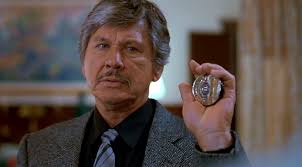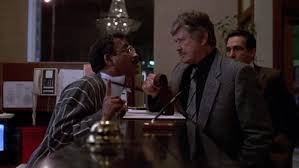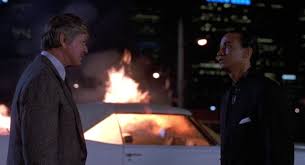The Neon Lights of the 80's: J. Lee Thompson's Kinjite: Forbidden Subjects (1989)
- daronmuray
- Jan 7, 2020
- 4 min read
After working together on crime thriller Messenger of Death, director J.Lee Thompson and Charles Bronson would go on to collaborate on Kinjite: Forbidden Subjects (1989), an extremely sleazy crime thriller, more akin to the works of Bronson’s other main collaborator Michael Winner than his films with Thompson.
The plot is based around Japanese businessman Hiroshi Hada (James Pax) , who witnesses a young girl being molested in a crowded Tokyo subway. He is transfixed that the girl doesn’t call out to let anyone know what is happening.
After being transferred to Los Angeles, Hada ends up trying to copy what he had seen back in Tokyo by attempting to molest a young girl he spots on a crowded bus. Unlike in Tokyo the girl screams which forces Hada to run. Hada’s actions lead to a number of Asian men in the local community being beaten by people who think they may be the person who groped the girl on the bus.

After this Hada’s own daughter goes missing, with her ending up part of a teenage prostitution ring. Vice Cop, Lt Crowe (Charles Bronson) is appointed to find the man’s daughter. Unfortunately, Crowe’s daughter is who Hada attempted to molest on the bus. Although Crowe doesn’t know that Hada is the same man, the incident has made Crowe extremely bitter towards Japanese people, something he must overcome in order to find Hada’s daughter.
Kinjite: Forbidden Subjects would prove to be one of the lower points of J. Lee Thompson’s career. Whilst competently made, the film is tonally all over the place, with certain scenes being made to titillate or shock in equal measure, whilst others are sometimes played for laughs. Even the last scene has a character getting raped whilst Bronson smiles at the camera. It is unclear if the audience should be shocked or cheering while this character gets his comeuppance.
At least Thompson still does a professional job behind the camera, giving the film that slick sheen that many films from the 1980’s seem to have. At least viewers could never complain that Kinjite is boring, with Thompson including some extremely well-done action scenes throughout the film, even if it is painfully obvious Bronson is doubled during the majority of them.
By this point in his career, it was apparent that Charles Bronson was too long in the tooth for these types of roles. Critics had even commented at the time that he was too old to be playing a serving detective. Although it is clear that his best years were behind him, fans of Bronson won’t be disappointed with him putting in a solid performance and doing what he can within the limitations of his role.
The remainder of the cast all put in good work but are mostly cast in underwritten roles with the likes of Peggy Lipton playing the typical wife role and Juan Fernandez showing up as a stereotypical villain.
James Pax does slightly stand out from the supporting cast due to his character getting more to do. As well as being concerned over the kidnapping of his daughter he becomes increasingly nervous as the film progresses in case Bronson finds out what he done to his daughter. Pax is probably most recognisable to audiences for his role as Lightning in John Carpenter’s Big Trouble in Little China (1986).
James Pax does slightly stand out from the supporting cast due to his character getting more to do. As well as being concerned over the kidnapping of his daughter he becomes increasingly nervous as the film progresses in case Bronson finds out what he done to his daughter. Pax is probably most recognisable to audiences for his role as Lightning in John Carpenter’s Big Trouble in Little China (1986).
As mentioned, Kinjite is one of the sleazier films in Bronson’s filmography which is saying something considering he worked with Michael Winner multiple times. The script is by Screenwriter Harold Nebenzal additionally has an overly bleak outlook which doesn’t transition well with the attempts at humour injected throughout the movie.
Additionally certain plot points seem to be being forgotten about as the film progresses. Even the molesting of Bronson’s daughter isn’t dealt with as expected. However this could be an issue with how the film has been edited, although there isn’t any information available to confirm this.
Nebenzel only worked on a handful of films as a scriptwriter, with only the earlier The Wilby Conspiracy (1975) being a standout. He was better known as a producer, working on such films as M (1951) and Cabaret (1972).
Kinjite: Forbidden Subjects was the “last” for a lot of people involved. It marked the final collaboration between J. Lee Thompson and Charles Bronson, with Thompson retiring thereafter. It also marked the final film Pancho Kohner produced to starred Charles Bronson. The two had worked together since 1976 with St Ives.
In addition, Kinjite: Forbidden Subjects was the final film Bronson made for Cannon Films, although he would go to work with Menahem Golan some years later on Death Wish 5: The Face of Death (1994), which Golan produced.
Fans of Bronson’s will still want to check Kinjite: Forbidden Subjects out, as although it isn’t the best to come from either Bronson or Thompson there are still enough enjoyable aspects to make it worthwhile.
Rating: 3/5










Comments